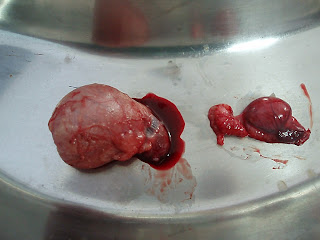Warning: Pictures of body parts and surgery are depicted - if you have a weak stomach, do not read on.
After all, they are the kids of a vet in a family business - these kids should be able to diagnose the reason why Fluffy did not eat dinner that night, shouldn't they?
If vets should be available at any time of the day or night to answer any question from any pet owner, then their children should equally suffer the same fate. (I am being sarcastic in case you missed it).
Recently, my daughter received a phone call on a saturday night from a friend of a friend of a friend asking for veterinary advice. To cut a long story short, the dog did go to an after hours vet, had emergency surgery and is now doing well. It cost several thousands of dollars to treat a common but serious condition of older undesexed female dogs.
This much loved dog had a pyometron. What has prompted this post, is not the fact that my daughter was rung up on a saturday night, but that the pet owner claimed her vet had never told her, or warned her, about the risks of keeping her female dog undesexed.
I speak to pet owners about this all the time, and the most common reply is "aren't they too old to get desexed".
Oh how I love to be able to say, let us a wait a year or two for them to get younger, but haven't had the guts yet to say that out loud!
I would much rather desex an older female dog in general good health, rather than wait. If we wait for the pyometron to develop, they will still need to undergo an expensive emergency surgery but at time when they are toxic from the infection, with possible liver and kidney damage.
Pyometron is an infection of the uterus, which usually occurs a few weeks after a dog has a heat cycle. The signs can be as vague as being "off colour", to be more obvious such as smelly vaginal discharge, drinking alot more than usual, with an abdomen looking like they are going to deliver puppies.
I am not writing this to say that every dog should be desexed, and that you are an irresponsible owner if you do not take that step. What I am trying to say is that EVERY pet owner needs to stand by their decision on whether to desex their dog or keep them entire.
This is a decision which has consequences - some positive, some negative.
What about our male dogs? Our older male dogs are at higher risk of testicular cancer, prostatic infections and perianal tumours (lumps around the bum).
 |
| A really huge testicle, and then one not so big! This is cancer. |
As a vet, I am more than willing to discuss the pros and cons of desexing of both male and female pets, as it is a decision that should be never be taken "for granted".
Any questions, let me know. My nurses Dirk and Tegan are available to discuss with you the procedure and what is involved.
 |
| Scrubbing up for pretend surgery! |
Welcome the mad vet house!
